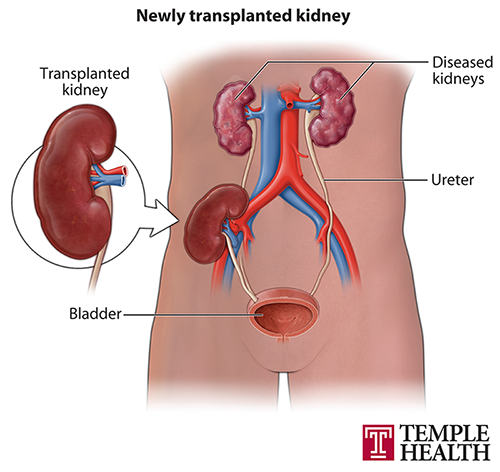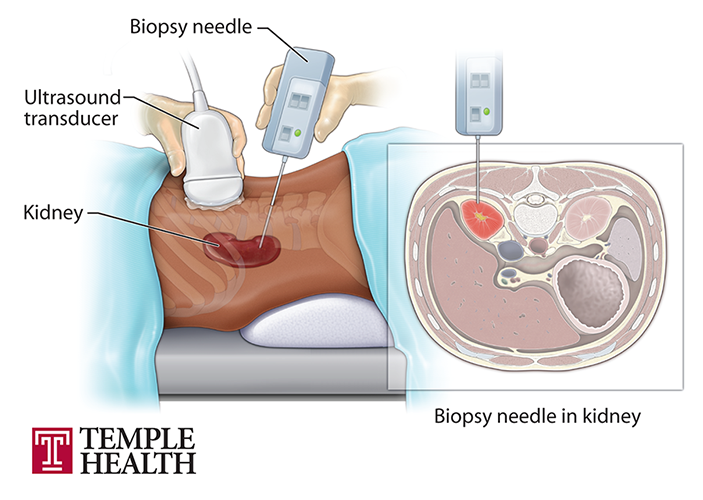For many, kidney transplantation is the start of a new lease on life. While most kidney transplants are successful, complications can occur, such as kidney rejection. Kidney rejection is when your body does not accept the new organ. It can happen just after your surgery, or in the years following your transplant. Through a treatment plan of immunosuppressive medication, the effects of rejection can be reversed and your body can readjust to your new kidney.
What Is Kidney Transplant Rejection?
When a new kidney is placed, your body reacts as if it’s a foreign body. Immunosuppressive medicines can help prevent your immune system from damaging your new kidney.
Rejection can occur at any time after your transplant, but it’s more likely to happen within the first 6 months. To reduce your risk of kidney rejection:
- Take your medicines as directed
- Lead a healthy lifestyle
- Keep your follow-up appointments
- Immediately let your transplant team know if you have any problems or complications
Kidney rejection is a common complication after kidney transplant, and it does not mean your kidney will be removed or that you will have kidney failure. If you do experience kidney rejection, doctors can usually treat the condition by adjusting your immunosuppressive medicines.

The Symptoms of Rejection
Your transplant team will perform periodic blood tests to make sure your body is accepting your new kidney. If your creatinine level starts rising, this may indicate kidney rejection.
You will also learn about the symptoms of kidney rejection. If you notice any of the following symptoms after your transplant, contact your transplant team as soon as possible:
- Fever higher than 100 degrees F
- Flu-like symptoms such as chills, headaches, dizziness, muscle aches
- Nausea or vomiting
- Swelling or sudden increase in weight
- Decrease in the amount of urine you’re passing
Preventing Rejection
In addition to taking your immunosuppressive medicines as directed by your transplant team, there are steps you can take to reduce your risk of kidney rejection. These include:
- Eat a healthy diet, low in salt and fat
- If you have diabetes, watch your blood sugar
- Incorporate exercise into your daily routine as directed by your doctor
- Manage stress and watch for signs of depression or anxiety
- Wash your hands regularly
- Stay away from people who are sick and avoid germs
- Drink lots of water to stay hydrated
- Contact your transplant team with any issues
Diagnosing Rejection
During your follow-up appointments, your transplant team will conduct a series of tests to help detect any signs of rejection. These tests include:
Bloodwork
Your blood will be drawn at every visit to monitor for signs of low white blood cell count, low red blood cell count and low platelet count, which can indicate infection, anemia, or lack of an ability to form blood clots.
Renal ultrasound
This is a non-invasive test performed in a radiology lab. It uses sound waves to look at your kidneys, your bladder and your blood vessels for signs of damage.
During the procedure, you’ll be asked to lie on an exam table. A technician will apply gel to your skin, then rub a probe in the area of your kidney. You may be asked to hold your breath or move slightly to help capture clear images. The procedure takes about 20 to 30 minutes.
Kidney biopsy
A kidney biopsy is done periodically to monitor the health of your new kidney. During this procedure, you’ll lie on an exam table. Your doctor will apply gel onto your skin and rub a probe over the area of your transplanted kidney. Once the best location for the biopsy is identified, your doctor will numb the area. A small needle is inserted through your skin to take tissue samples. Once the needle is removed, your doctor will place a bandage over the area.
Kidney biopsy is usually an outpatient procedure that takes about 1 hour, from start to finish. Many patients choose to get their kidney biopsy before their scheduled appointments so they can review results with their doctor in person.

These tests are designed to identify rejection early, when you have a better chance of successful treatment. Although kidney rejection is a common complication of kidney transplant, it’s treatable in most cases.
Treating Rejection
If your body is rejecting your new kidney, your transplant team will determine the best treatment for you. Kidney rejection is usually treated by adjusting your immunosuppressive medicines. You may be admitted to the hospital for a few days so your transplant team can closely monitor your progress and look for signs of infection. Once you recover, your transplant team will continue to follow you closely.
Ready for an Appointment?
Schedule an appointment with the Temple Kidney Transplant team or call 800-TEMPLE-MED (800-836-7536).



